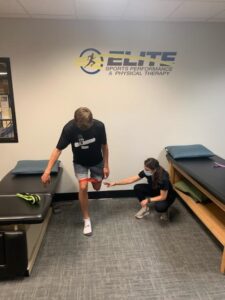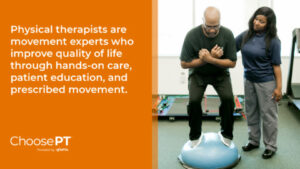What’s a Movement Diagnosis?

Medical diagnoses don’t need much of an introduction. They’re what you get from your doctor when you’re sick. Examples would be influenza, diabetes, or hypertension. They describe the underlying problem that is causing your symptoms. When people feel sick, they know they need to go to the doctor and find out what’s going on to get treated. We should treat movement the same way. If you’re having pain when you move, can’t do things you used to be able to – like throw a ball without pain in your shoulder or elbow – or can’t do things you want to do – like swing a golf club or pick up something heavy – then it may be time to get a movement diagnosis.
A movement diagnosis does the same thing as a medical diagnosis; it describes what’s causing your difficulty with movement. Some examples would be difficulty standing from a chair secondary to decreased force production, scapular dyskinesis, or lower crossed syndrome. Diagnoses set the roadmap for treatment, so getting them right is crucial.
Human movement is complex and is influenced by more than just your muscles and joints. According to the APTA, movement is impacted by the following systems:
- Endocrine
- Nervous
- Cardiovascular
- Pulmonary
- Integumentary
- Musculoskeletal
Because of the complexity and interplay between these components of the movement system, getting a movement diagnosis correct is often very difficult. Physical therapists, including the expert Physical Therapy team at Elite Physical Therapy in Stoughton and Foxboro, are experts in human movement with doctoral level training and should be your first stop for movement issues. Not only can our team of physical therapists provide an accurate movement diagnosis, they will also design a treatment plan to correct the underlying issues and help get you moving well again.

So if you you’re not moving the way you used to or would like to, contact our Physical Therapy team today in either Stoughton or Foxboro to set up a PT evaluation and get you MOVING in the right direction!
Elite Physical Therapy Stoughton: PTinfo@elitefitcenter.com
Elite Physical Therapy Foxboro: info@elitesportsandpt.com
References: http://www.neuropt.org/docs/default-source/default-document-library/movement-systemdiagnosis-in-neurologic-physical-therapy-where-are-we.pdf?sfvrsn=0 https://journals.lww.com/jnpt/FullText/2018/04000/White_Paper__Movement_System_Diagnose s_in.9.aspx http://www.apta.org/MovementSystem/ http://www.apta.org/MovementSystem/Template
